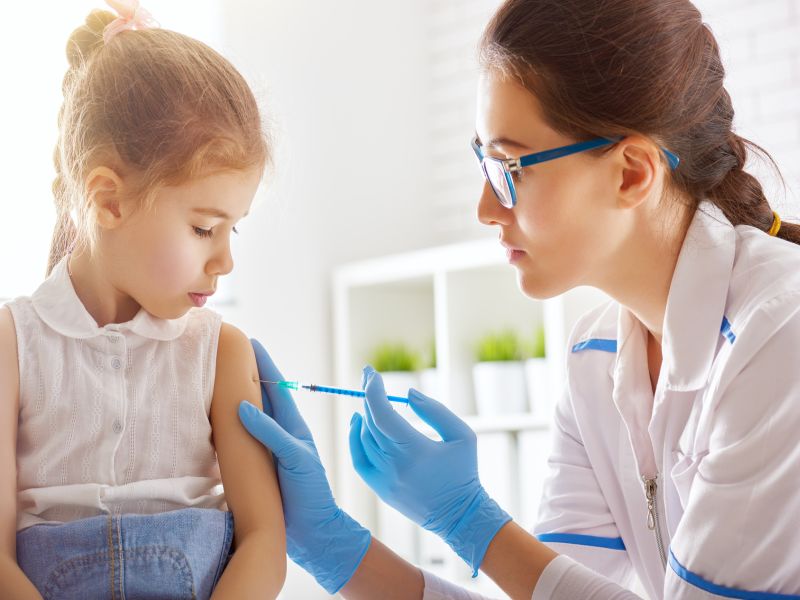By Dennis Thompson
HealthDay Reporter

TUESDAY, July 2, 2019 (HealthDay News) -- California's crackdown on childhood vaccination exemptions cut in half the percentage of kindergartners who didn't have their required immunizations, a new study shows.
The rate of kindergartners without up-to-date vaccinations decreased from around 10% in 2013 to about 5% in 2017, after California implemented a three-pronged strategy to improve immunization rates.
This was an "impressive decrease in the number of children not up-to-date on their vaccines after the three interventions were implemented," said lead researcher Cassandra Pingali, who led the study as a graduate student at Emory University in Atlanta.
Thanks to improved immunization rates, the chances that not-fully-vaccinated kindergartners might bump into each other in school fell from 26% in 2014 to just 5% in 2017, researchers reported in the July 2 issue of the Journal of the American Medical Association.
In 2016, California became the first state to ban all personal belief exemptions for its school vaccination requirements, Pingali said.
That final move came after the state first tightened requirements for obtaining a personal belief exemption in 2014 and then launched a campaign to educate school staff on the proper application of those requirements, Pingali said.
California took those steps after realizing that there were large pockets within the state with high rates of students whose parents had refused childhood vaccinations, Pingali said.
During 2012-2013, there were 124 clusters containing 3,026 schools with high rates of kindergartners not up-to-date on their shots, researchers said.
But by the 2016-2017 school year, that had dropped to 110 clusters containing 1,613 schools, the findings showed.
"During 2016 and 2017, the reductions appear to be largest in the southern portion of the state," Pingali said. "Northern California maintained the highest predicted rate of students without up-to- date vaccination status throughout the study period with relatively minor changes during the implementation of the three interventions, compared with the rest of the state."
These results show that public policy can quickly improve vaccination rates among children, but that it might require more than one bite of the apple, said Dr. Matthew Davis, head of academic general pediatrics and primary care at Lurie Children's Hospital of Chicago.
"I think the California story illustrates that more than one policy change is necessary to achieve substantial change in protection of public health over a short period of time," Davis said.
Vaccination requirements currently are a state-level issue, but these numbers indicate it might be time to consider a national policy, said Davis, who wrote an editorial accompanying the new study.
"We propose that national outbreaks like we are seeing in 2019 make us wonder whether the time has come to achieve a consistent vaccination policy across the country, so it doesn't matter in which state you live -- what matters is how we are trying to protect the public health consistently across all states," Davis said.
"This is a study I think can provide guidance for other states making changes in their own vaccine exemption policies, and could set the stage for a national conversation on vaccine exemptions," Davis concluded.
Pingali noted that New York just passed legislation eliminating religious exemptions to school-mandated vaccinations, in response to the measles outbreaks there.
In May, Maine passed legislation to eliminate religious and philosophical exemptions, she added. And in Washington, a new law eliminated personal and philosophical exemptions to the MMR (measles, mumps and rubella), vaccine but left religious and medical exemptions in place.
"There is a very dynamic vaccine policy environment currently," Pingali said. "This is a great opportunity to compare the effects of similar vaccine legislation across states."
More information
The U.S. Centers for Disease Control and Prevention has more about childhood immunizations.
Back

The news stories provided in Health News and our Health-E News Newsletter are a service of the nationally syndicated HealthDay® news and information company. Stories refer to national trends and breaking health news, and are not necessarily indicative of or always supported by our facility and providers. This information is provided for informational and educational purposes only, and is not intended to be a substitute for medical advice, diagnosis, or treatment.






